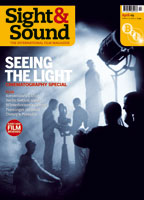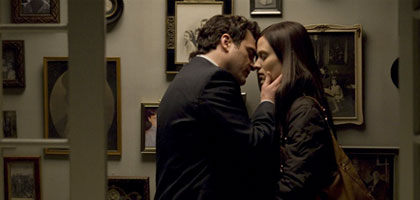Primary navigation


Our synopses give away the plot in full, including surprise twists.
Brighton Beach, Brooklyn, present day. Bipolar twentysomething Leonard is rescued after jumping into the bay, his second suicide attempt after a broken engagement. He lives with his parents and is attracted to kindly Sandra, daughter of Michael Cohen, who is buying his parents' dry-cleaning shop; they start to date. He also falls for neighbour Michelle, a gorgeous, nervy ex-druggie who is having an affair with married lawyer Ronald. Michelle takes Leonard clubbing, and treats him as a friend. At an awkward dinner, Ronald asks Leonard to watch over Michelle. Meanwhile, Sandra and Leonard are becoming an item, as Leonard obsesses over Michelle. He leaves the Cohens' bar mitzvah to rush a miscarrying Michelle to hospital. Michelle is disenchanted with the fond but unavailable Ronald. Sandra sees Leonard's scarred wrists at lunch and tells him that she wants to look after him. Leonard confesses his love to a vulnerable Michelle; they have sex briefly, and plan to leave for San Francisco together. Leonard, ecstatic, buys an engagement ring. Michael Cohen sees it, assumes it's for Sandra, and advises him not to mess up the buyout or the marriage. Leonard tells his doting mother that he's leaving with Michelle. He bolts out of his parents' New Year party, but Michelle is late to meet him. Ronald has left his wife after learning of the miscarriage, and she has chosen him. Devastated, Leonard runs into the sea, but emerges, retrieves the ring and returns to the party. He presents it to Sandra, and enfolds her in a desperate, unhappy embrace.
Anyone expecting a fourth operatically pitched crime thriller from James Gray, in which brothers and fathers wrestle Fate and lose, can fuggedaboudit, as they say in the New York outer boroughs he limns so lovingly. Two Lovers sees Gray move into unapologetic melodrama with this sombre, superbly crafted if faintly lugubrious drama of romantic obsession. Not that it's that big a stretch for him (as Geoffrey Macnab noted, his 2000 film The Yards is "family melodrama posing as a thriller"), but the slow-burning tale of Leonard, a bipolar Brooklynite torn painfully between the competing charms of nurturing neighbourhood girl Sandra and the gorgeous and unstable uber-shiksa Michelle, may alienate those critics and fans who hailed him as a new Coppola. Scratch Two Lovers, however, and Gray's familiar, familial obsessions come tumbling out.
Like the protagonists of Little Odessa (1994), The Yards and We Own the Night (2007), Leonard is anxious to shed his neighbourhood and family obligations. This is yet again a movie about the ties that bind, except that here, poignantly, they are sustaining the vulnerable, suicide-surviving Leonard. Scratch further, and the ties that bind Gray to the Movie Brat generation he venerates emerge too. He's one of the few younger directors who can execute an absorbing 1970s-style, character-driven plot with real skill rather than mere mimicry. Perversely, getting out from under the guns-and-brotherhood stuff shows just how well he can work in any genre, not just as a reanimator of Godfather themes for Generation X. Two Lovers has an expressive sincerity, an intensity of theme and place and performances that elevates its torn-between-two-lovers story into something distinctive.
Much of this intensity pours from Joaquin Phoenix's compellingly goofy, damaged and charming Leonard, ping-ponging ceaselessly between his exhilarating if unrequited love for glamorous ex-junkie Michelle and Sandra's family-sanctioned and welcoming bosom. Phoenix has done fine work with Gray in the past, (since his twitchy prodigal son in We Own the Night he's often seen as the De Niro to Gray's Scorsese). But here he's outstanding, able to signal a whole raft of emotions with just a look or a shrug, reeking with need and puppyish appeal as he and Gwyneth Paltrow's brittle Michelle flirt with almost teenage caginess around Leonard's parents' flat on their first meeting. If the rumours are true that Phoenix is deserting the screen for a hip-hop career, legislation should be swiftly drafted to retain him as an actor, rather as rare birds are protected in national parks. His potent, understated performance, along with strong, nervily self-involved playing from Paltrow, helps the film surmount the potential overdramatic pitfalls of the romantic-obsession movie. Responding to Michelle's urgent call for company while she miscarries her married lover's child, or spying on her through their adjoining apartment windows, Leonard looks affectingly heartsick rather than ludicrous. And their secret rooftop trysts, studded with pleadings, emotional evasions and an unsettling bout of pity sex, strike a genuinely pathetic rather than bathetic note.
Like Phoenix's contained playing, Gray makes this largely a film of resonant and telling details: the wall of family pictures that underscore Leonard's parents' fond, anxious hopes for his happiness; his gentle, hopeful seduction of Sandra in his boyhood bedroom, underlining their umbilical tie to their families. Occasionally one misses the big, tense set-pieces of yore - say, the frantically skidding rainstorm car chase that made We Own the Night pop like a firework. But there are compensatory pleasures, like an exquisitely uncomfortable uptown dîner à trois with Michelle's married lover, packed with Leonard's gaucheries and topped off with the squirming humiliation of him being covertly enlisted to watch out for Michelle on his rival's behalf.
The flipside of the film's facility in translating male romantic angst so sympathetically on screen is that however absorbing and well rounded it is, this piece still plays the old comfort-girl-versus-trophy-girl tune we've been hearing since Portnoy's Complaint. It just plays it way better than most, is all. Yes, Leonard's two lovers symbolise the warm, stifling suburbs pitted against the neurotic glamour of New York to an unsubtle degree, yet Gray's skill in characterising spaces (the confining family flat, the catnip magic of New York at night, that liminal rooftop romance conducted in chilly grey Brooklyn light as the camera swoops, Vertigo-style, around them) means that he carries it off. The film feels real, and the places reverberate as meaningfully as the performances - Leonard's attempts at drowning himself in Sheepshead Bay and Brighton Beach make a resonant top-and-tail to the movie, but the latter, with its incongruous seashore mix of anguish and stoicism, is masterly. It's the grand yet ground-down gesture that leads into the film's gloriously desolate ending as Phoenix fixes the camera with a single eye, made eloquent by utter despair. In a glance, he conveys the fateful choice that confronts all of Gray's heroes, for whom the last and only exit from the neighbourhood and their family's expectations is the door marked 'death'.